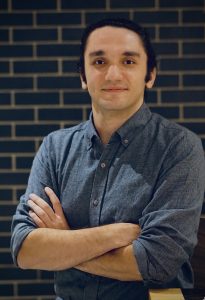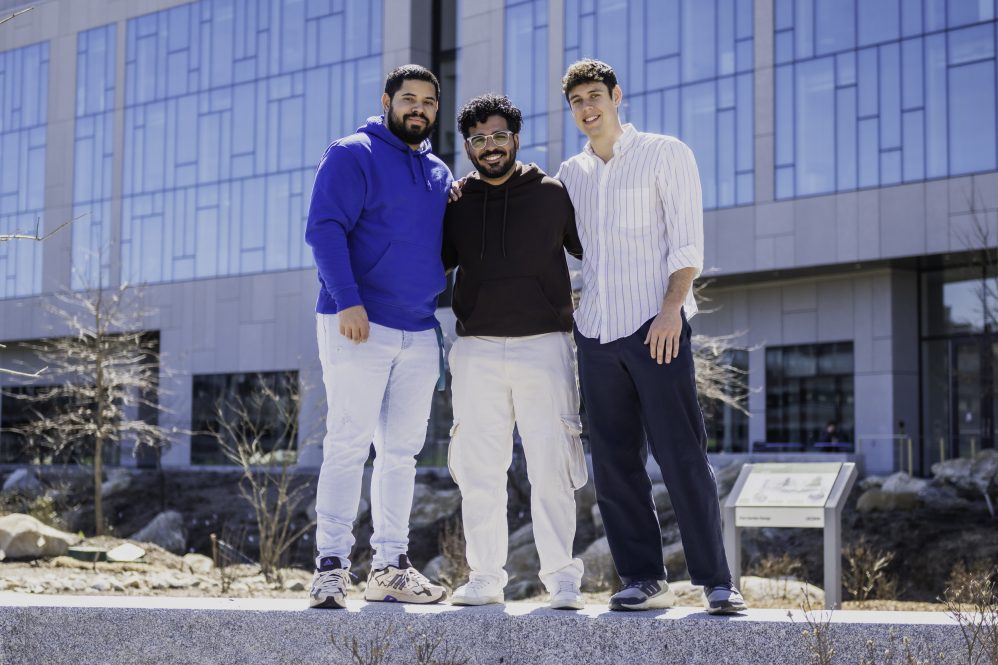Although personal health-tracking devices have proliferated in recent years, entrepreneur John Toribio, a Ph.D. candidate at UConn, believes his innovation is far superior to what’s available on the market today.
Toribio Labs is the winner of UConn’s 2024 Innovation Quest (iQ) entrepreneurship competition and has received a $15,000 award.
The company is creating wearable garments that provide real-time relevant analytics about human bio-mechanical data, like heart and muscle performance, cognitive awareness, emotional status, and physiological workload. By embedding sensors in clothing, the devices can give a better sense of the overall health of a wearer. Their proprietary design is their biggest strength.
“There’s a lot of gaps in data and a great deal of estimation with the devices currently on the market. We saw the opportunity to create something that would make a real-world impact for athletes,’’ says Toribio.
“Our goal is to get information that will determine who needs more training, assess progress, determine risk of injury and more,’’ he says. Eventually the product could be valuable in the healthcare and defense industries.
The iQ program helped Toribio and his co-founders create a business model, understand what makes a business viable, and identify the best way to launch the company.
Dozens of Successful Companies Grew Through iQ
Since its inception 13 years ago, UConn iQ has helped entrepreneurs create dozens of innovative, successful, and profitable companies.
This year, the top three teams—who share $30,000 in prize money—are all addressing human health and wellbeing. The next phase of the entrepreneurship development program, called Summer InQbator runs from May 8 to June 14. The three top finalists will be joined by five additional UConn-founded startups, all with strong potential.
“We had a wonderful year this year. What is really exciting is the wide range of business ideas. We have everything from wearable tech to personalized gene therapy to virtual reality and really warm, yet stylish, boots,’’ says Program Director Kevin Gardiner ’06 MBA. Gardiner is an adjunct professor in business and engineering who has worked as a senior manager for both startups and long-established companies.
IQ applications were up 22% over last year, an indication of how much enthusiasm UConn students continue to bring to entrepreneurship, he says.
Gardiner credits iQs mentors and judges—who include software experts, chemists and other business standouts—who donate their time to help the startup founders. A former iQ mentor himself, Gardiner says that helping a new business develop, and avoid making common mistakes, is incredibly rewarding. The expertise and dedication of the mentors is critical to the program’s success, he says.
Nature May Offer Clues to Preventing Cancer Spread
One of the intriguing mysteries of science is that when a cow or a horse develops a cancerous tumor, it remains localized and doesn’t spread throughout the animal’s body as it does with humans. UConn Ph.D. candidate Ashkan Novin is eager to find out how that protection can be applied to people.
Novin’s company, Genesist, an evolutionary, medicine-based gene therapy for preventing cancer metastasis and recurrence, won the $10,000 second-place prize in this year’s iQ competition.

Novin has been working on the medical puzzle since he arrived at UConn five years ago, and his company has won a number of entrepreneurial awards during that time.
“We want to see how healthy cells can become more resilient. We believe we have found the answer in nature,’’ Novin says. “Unlike other cancer treatments, we’re focusing on the ‘good guys,’ the healthy cells. For researchers like myself, cancer has been a ‘black box’ and we’re trying to learn different angles to solve it. One day there will be a cure and I hope that we will play a part in that.’’
At iQ, he learned to improve his pitch deck and presentation, something he says is a crucial factor in presenting and growing Genesist. “There is still a lot to learn and our questions are evolving,’’ he says. “We know we need to be educated about the business side of what we do.’’
The company is finalizing its studies now and hoping to move to human trials in 2026. The cost of creating a medical treatment is extraordinarily expensive and the regulations are very complex. Through UConn, Genesist has formed a team of advisers, mentors, and supporters.
“We’re excited to work with experts who have been in our shoes and can help us with trials, securing funding, and navigating regulatory requirements,’’ he says.
Nihara Lijan’s Concussion Led to Creation of VitalGuard
Nihara Lijan ’27 (CLAS) played basketball in middle school, and during one game she crashed head-to-head with another player. Lijan passed out. When the coach asked if she was OK, she says she was fine, even though she felt faint and nauseated from a concussion.
“I realize now it is dangerous to ignore something like that,’’ she says.

Not long after that experience, she started working on VitalGuard, a technological-driven mouthguard that can detect four main neurological injuries: concussions, cerebral contusions, hematomas, and chronic traumatic encephalopathies (CTE).
The device tracks the brain’s movement, measuring impact and bite force, which can differentiate between a clunk on the head and something more serious. Her target audience is athletes, particularly those at high risk for head trauma.
“A large number of head injuries go unreported, and I think this would give parents a sense of relief to monitor impact to the head and brain,’’ she says.
Her high school anatomy and physics teachers encouraged her to pursue her idea, and she entered it in a DECA entrepreneurship competition and won first place in her home state of Massachusetts twice. She continued on to international competition two years in a row. At UConn, she participated in the ‘Get Seeded’ entrepreneurship competition before testing her invention at iQ.
Lijan, who is studying physiology and neurobiology, says she particularly enjoyed the camaraderie from iQ’s other entrepreneurs, as well as the opportunity to expand her business knowledge. The next steps in her business journey involve improving her design, starting work on a prototype, and verifying that she is maximizing the use of available technology.
“When I started iQ, I didn’t know many of the business terms and now I do,’’ she says. “The biggest thing I’m so grateful for is the opportunity to present something like this and get feedback from the judges. They encouraged me to research my competitors, distinguish my product in the marketplace, and to improve aspects of my presentation. The whole experience has been inspiring.’’
Toribio, who is creating the wearable health monitors, is equally enthusiastic about the future that awaits him and his co-founders Kyle Mahoney and Josué Martínez-Martínez, both Ph.D. students, and Joshua Ross ’23 (BUS).
As a child, he says, he envisioned becoming an entrepreneur.
“When I got older, I thought I’d be a scientist, because that’s what I’m good at,’’ he says. “I didn’t think you could own a business without years of business graduate school. But now I think I have a realistic chance to become a CEO and a CTO!’’



